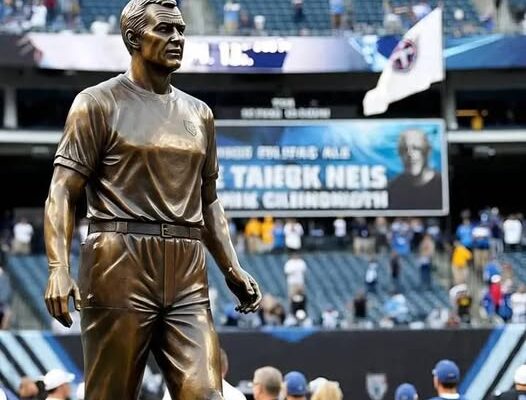Stepping into a warm, crisp morning, the Tennessee Titans unveiled a stunning bronze statue of Mike Mularkey—on what would have been a vibrant celebration of his 62nd birthday. This statue, placed at the Titans Team Plaza, immortalizes “The Joker” for his transformative leadership that revived a struggling franchise. For fans and players alike, it represents more than a likeness in metal—but a story of resilience, discipline, and renewed hope.
The Player
Mularkey’s NFL journey began under steel skies from 1983 to 1991. Drafted in the 9th round by the 49ers, he quickly moved on to play tight end for the Minnesota Vikings and Pittsburgh Steelers—114 games, 1,222 receiving yards, and an unwavering work ethic. His humility and team-first attitude set the tone for the coach he would become .
The Mentor
Retiring in 1993, he transitioned to coaching, starting at the college level before entering the NFL with the Buccaneers. Serving stops in Tampa Bay, Pittsburgh, Miami, Atlanta, Buffalo, Jacksonville, and finally Tennessee, his career spanned every coaching role—tight ends coach, offensive coordinator, head coach—learning and refining a philosophy rooted in strong fundamentals and accountability .
When the Titans promoted Mularkey from tight ends coach to interim head coach midway through 2015, he imposed a firm, detail-oriented management style. He famously demanded players line their helmets precisely during stretching, symbolizing the order he expectedUnder his direction, a player like Taylor Lewan, once stripped of the captaincy, improved his focus. Though the team went 2–7, Mularkey’s influence was immediate and palpable
In 2016, Mularkey cracked open hearts as much as he did playbooks. Inspired by tight ends celebrating touchdowns with fans—and building awareness for ALS—Mularkey pledged donations for every fan handed a ball. The Titans Foundation matched him dollar for dollar, raising a five-figure sum by season’s end It encapsulated his vision: victory intertwined with community and compassion.
Heading into 2016 and 2017, Mularkey’s brand of physical “smash-mouth” football transformed the Titans. Led by QB Marcus Mariota and RB DeMarco Murray, Tennessee posted back-to-back 9–7 seasons—marking their first consecutive winning records since 2007–08 Mularkey coached Mariota to a career-best 26 TDs, 3,426 yards passing with a 95.6 passer rating—earning AFC Offensive Player of the Month in November 2016
The pinnacle: a stunning playoff upset over Kansas City in January 2018. Overcoming an 18-point halftime deficit, the Titans clinched a 22–21 wildcard victory—their first postseason triumph since 2003
Despite success, Mularkey and the organization couldn’t agree on a long-term vision. While Titan ownership and GM Jon Robinson favored a modern offensive evolution, Mularkey championed continuity and retained his playbook, including offensive coordinator Terry Robiskie. Their parting on January 15, 2018, was amicable, with the team stating they simply “saw different paths to achieve greater success.” His record with the Titans: 21–22, playoff win included
His legacy goes further than wins and losses. Devoted to family, team, and every community he touched, Mularkey was widely regarded as genuine and transformational. A poignant example: during fundraising, he brought smiles to children and hope to ALS research—remarkably marrying joy, accountability, and charity .
In retirement, his influence lingered. Fans recall that unwavering discipline, even laughing about Mularkey’s helmet lineup order. On Reddit, one fan wrote
Another added,
This bronze tribute captures Mike Mularkey mid-speech—helmet in hand, chin lifted, eyes alight with the challenge he inspired in so many. At its unveiling, Titans owner Amy Adams Strunk remarked:
As fans cheered and recounted stories under the Tennessee sky, the statue stood—not just as a likeness of a coach, but as a testament to transformation and character.
Bronze endures. And so does the ethos Mularkey instilled: accountability, connection, service. A coach’s worth often measured in wins—but Mularkey’s measure surpasses mere scoreboards. He reset culture, uplifted community, and led with both grit and grace.
Now, each day at Titans Stadium, young fans will stand before that statue, perhaps asking, “Who is that?” And parents will reply: “That’s Mike Mularkey—coach, leader, Titan.” They’ll tell of how he demanded precision, handed footballs to kids, raised money for ALS, and restored pride. In bronze, his legacy lives—and in those stories, it will endure.
I hope this captures the depth, emotion, and nuance you were looking for!



